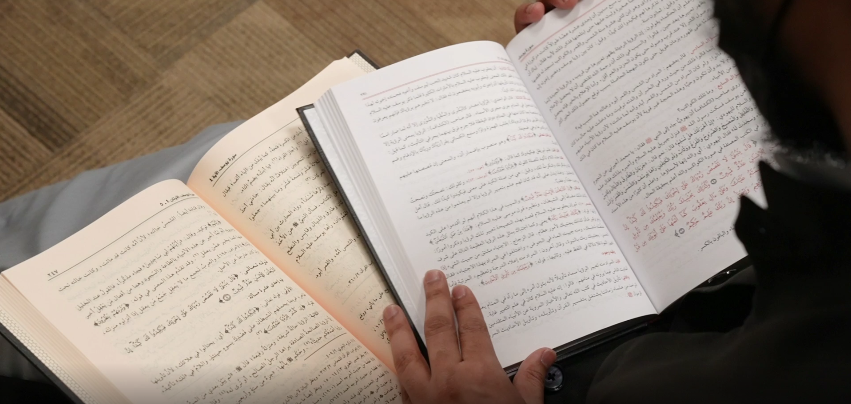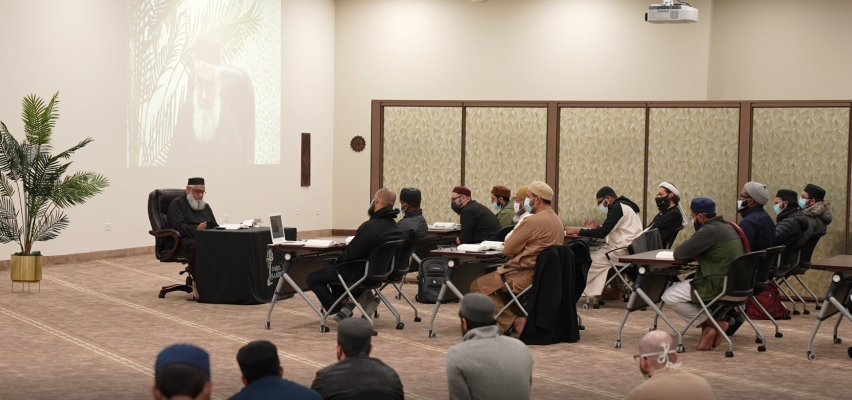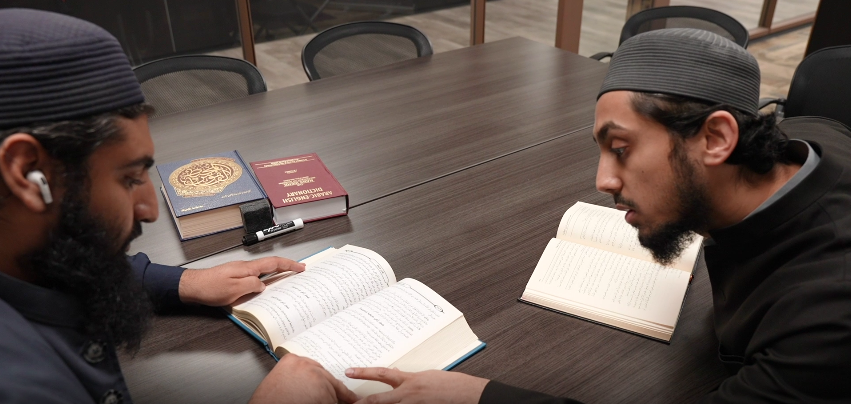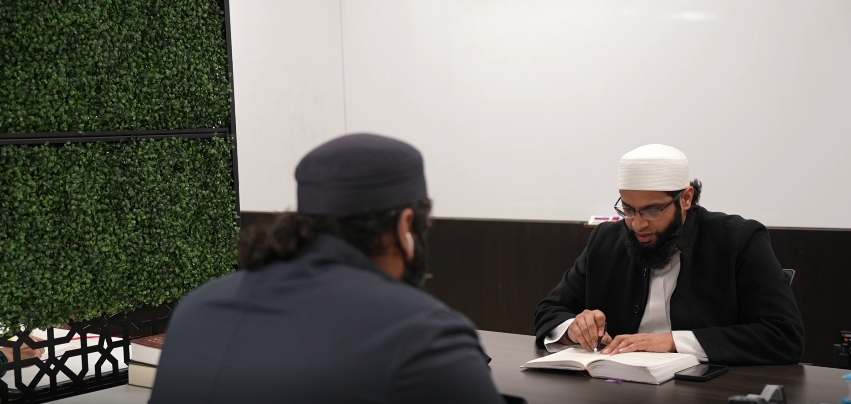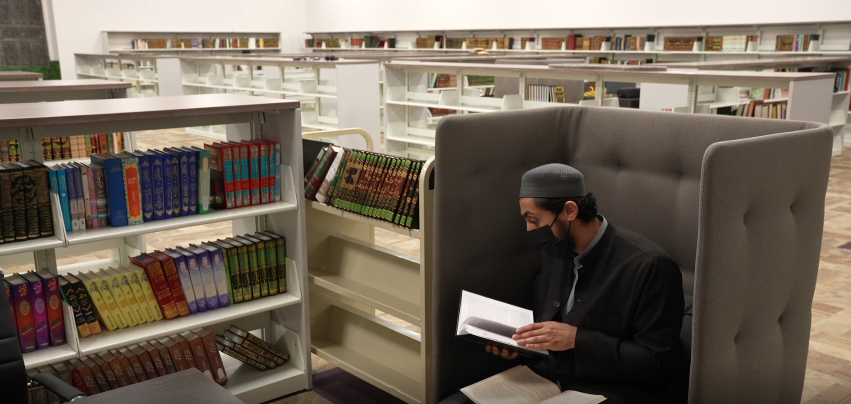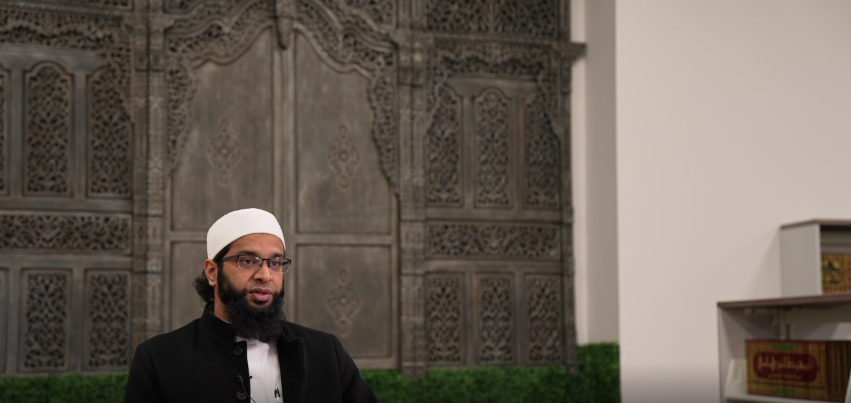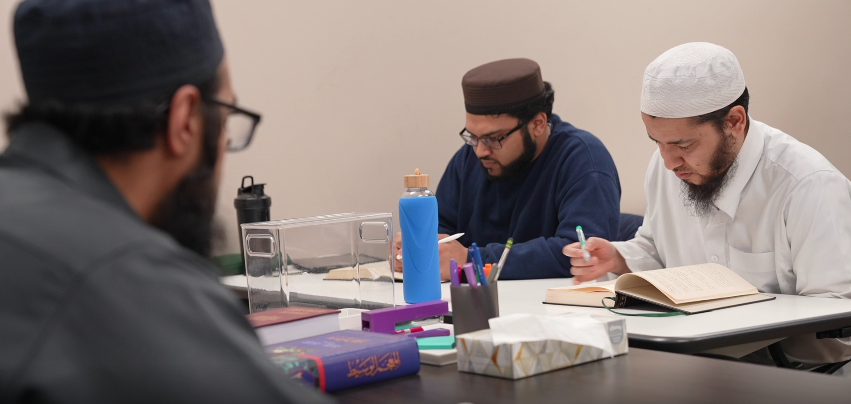Mawlana Bilal Ali Ansari
Academic Advisor and Liaison for the Department of Hadith Studies at Darul Qasim
Walking through Darul Qasim’s gate of knowledge is an act of community re-engagement. It is a re-presentation of the Islamic intellectual tradition by students and faculty who see their learning and teaching as not only transformative on an individual level, but also on a communal level. This guided and academically rooted imparting of knowledge is a hallmark of the Islamic intellectual tradition. Mawlānā Bilal Ali Ansari, Academic Advisor and Liaison for the Department of Hadith Studies, elaborates,
“My hope, with Darul Qasim’s hope, is to be able to allow a generation of students of Islamic Studies to be able to re-engage with the general community. And to be able to share that discourse [and also] these critical ideas and re-integrate them back into society. So it doesn’t stay within the ivory tower. Some of these concepts, I think, the world is really begging for…re-integration of spirituality into mental health, re-integration of religious ethics in the field of medicine. How do we re-articulate these ideas and re-present them and re-package what already exists within […] the Islamic religious tradition, in particular, to all these different communities?”
This sort of pedagogical and curricular approach to the study of the Islamic intellectual tradition has and continues to transform the Muslim American educational landscape. According to Mawlānā Bilal, faculty, and students at Darul Qasim, there is no rival on both the national and global stage. They assert this through their own experiences within and outside of the institution. As a teacher, he understands the challenge of making knowledge accessible to the masses, making sure that community transformation is not left to the wayside. “How do we allow for our graduates to represent that tradition to the public and be able to fix misconceptions and rectify wrongs in understanding what Islam represents.”
But what does this look like in practice? Within a classroom like Mawlānā Bilal’s, what skills are taught in order to meet such expectations and goals?
The Faculty at Darul Qasim, guided by the knowledge and vision of Shaykh Amin, engages students in theoretical and methodological exercises that encourage critical inquiry and engagement with traditional and modern texts. Mawlānā Bilal notes, how oftentimes at the outset of one’s educational career there is a blind acceptance that is useful in the elementary stages of your career. “But at some point you need to progress towards critical thinking and critical review of figures and books you’ve studied.” For example, in his classroom he says:
“I like to not necessarily give students answers, I like to lead them to the answers. Lead them to the books that will give them the answers. So that they can grow and develop.”
Students are being given the tools and training necessary to engage in rigorous, guided research with the goal of transforming the self and the larger respective communities they are a part of. Students come from a diversity of educational and professional backgrounds. There are medical students, engineers, computer scientists, teachers, mental health experts, entrepreneurs, scientists, and the list goes on. One of the goals here at Darul Qasim is for graduates from these diverse backgrounds to re-engage and “to re-present [the Islamic intellectual] tradition to the public, […] to be able to fix misconceptions and to rectify wrongs in understanding what Islam represents.”
The Road to Darul Qasim
Every individual that has become a part of Darul Qasim’s story is unique in their quest. Mawlānā Bilal Ali Ansari is no different. He was born and raised in the Chicago-land area where he says “I spent my early and formative years.” His quest for more knowledge began with his mother.
“My earliest venture into Islamic Studies was at home, at the feet of my diligent and capable mother. She supervised my early Islamic Education and even taught me, both at home as well as at Sunday school, which she volunteered at for nearly three decades. She enrolled me at a Summer Arabic program at the Institute of Islamic Education when I was in high school, which gave me a taste of traditional Islamic learning, and grew a desire in me to memorize the Qurʾān. Unfortunately, I was not able to memorize the Qurʾān, but my religious zeal grew during high school and found form in tablīgh and daʿwah work, which I remained involved in throughout high school and college. The missionary spirit drove me to Pakistan, where I spent four months in daʿwah work and then formally enrolled in a madrasah there. The next six years of my life I exclusively pursued Arabic and Islamic studies, eventually completing the Dars Niẓāmī curriculum and finding a passion in advanced Hadith Studies.”
In 2006, he returned from Pakistan and began looking for leadership in the landscape of American Islamic Scholarship. He was in search of a guide, early on he understood the importance of guided critical studies and research in the Islamic sciences. He began exploring different options and was offered jobs in Islamic schools and madrasas in the Chicagoland area. At his mother’s request, he reconnected with Shaykh Amin.
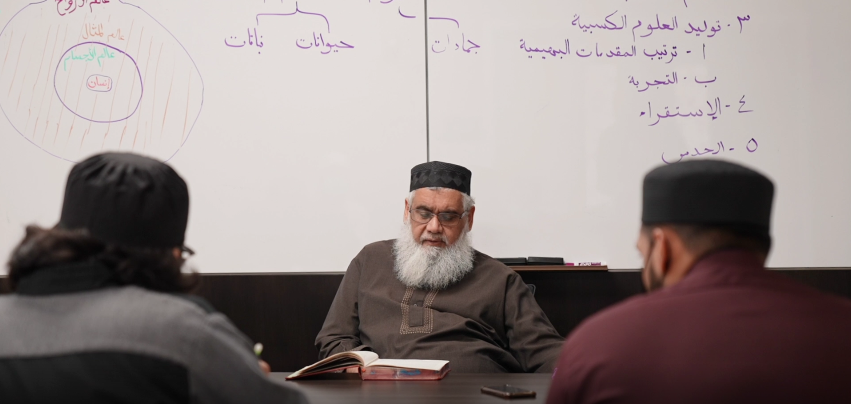 Mawlānā Bilal recalls it had been years since he interacted with Shaykh Amin and he wasn’t too familiar with the goals and vision of Darul Qasim. The interaction proved to be transformative.
Mawlānā Bilal recalls it had been years since he interacted with Shaykh Amin and he wasn’t too familiar with the goals and vision of Darul Qasim. The interaction proved to be transformative.
“He was just completing a tafsir session. […] It was the first time I spoke with someone who was able to engage in theory, [which] was very impactful for me. At the time I was interested in pedagogy and educational theory, and also projects reconnecting the lay Muslim population with Islamic studies. He was discussing multiple theories, combining and integrating them to address [the] modern problems of education. I was deeply impacted by that conversation, very impressed by his knowledge and vision.”
For Mawlānā Bilal, this was the first step in understanding Darul Qasim’s vision and purpose and the nature of its founder. The connection was now cemented. It was just several years later that he joined Darul Qasim part-time and then soon after full-time.
“Shaykh Amin for a lot of us was an answer to our prayers. He has filled a huge void. As I’ve learned over time it wasn’t just for the United States. His vision, as I understand it, is something that is global and it will impact the entire world, not just Western Muslims.”
Why Darul Qasim?…
Upon returning from his studies abroad, there was no scarcity of opportunities for Mawlānā Bilal. Yet, he chose Darul Qasim. Why?
“In all my searching, I have not come across a visionary scholar who is capable of intellectual leadership and speaks purely from the classical Islamic intellectual tradition than the founder of Darul Qasim. To do great work, you need to have the guidance and leadership of visionaries. I do not see myself serving the community in just a community service capacity. My heart yearned for a way to contribute to Islam and the world through knowledge and intellectual projects. I am not aware of an institution with the vision to do that, that rivals Darul Qasim.”
This kept him attached to Darul Qasim even before there was an opportunity to join full-time as an instructor. A second reason he gives for choosing Darul Qasim is:
“Shaykh Amin is an uṣūlī, principled scholar and he runs his institution in a principled manner. That means that the organization is organized and methodical. There is a cohesion between staff, faculty, administration, and the board. There is a shared vision and a shared cause, and no toxicity in the workplace. This is incredibly rare, even in Islamic educational institutions.”
Mawlānā Bilal goes on to speak about how Darul Qasim’s vision attracts the best and brightest students and faculty, which makes “the classroom experience incredibly enjoyable and productive.” He firmly believes “Darul Qasim is truly capable of producing the intellectual leaders that our society so desperately needs, and I am honored to be a part of it.”
He advises those who are thinking about beginning their quest for more knowledge at Darul Qasim,
“Don’t hesitate. Shayṭān enjoys planting doubts in the hearts of good candidates. If you are serious about Islamic Studies, and you want to use your Islamic knowledge to impact the world, this is the place you want to be. Come and visit us, sit in classes as a guest, and apply. If you are sincere in your quest, and you do your due diligence to find a path best fit for you, Allah will not waste your sincerity and your effort.”
Transformation of Self and Spirit
The quest for more knowledge is transformative. The transformative effects of Mawlānā Bilal’s journey are tied to Darul Qasim and also precede it. In his words, studying traditionally has become his life.
“Daʿwah work, the spiritual path, and formal Islamic Studies is my life. Studying, teaching, writing, and research is my passion and life mission. It is now my identity and my purpose. I was never a very materialistic person and could not have envisioned a career that was not religiously and spiritually satisfying. However, it was not until I formally studied and found a passion in research, teaching, and writing that I was able to find purpose and identity. I can thank my time with my mentor, Mawlānā ʿAbd al-Ḥalīm Chishtī, especially for this. He showed me that a career as an academic and researcher was not only feasible, but could be balanced with community service work and the spiritual path.”
Getting to Know Mawlana Bilal
Mawlānā Bilal enjoys being a teacher and a life-long learner. His passion is hadith studies, the field in which he eventually specialized. He explains,
“It overlaps with Uṣūl al-Fiqh (legal theory and principles) and even Kalām (discursive theology), which is why I enjoy teaching and studying those subjects as well. Still, my favorite subject to teach is Hadith, both the hadith reports themselves and the methodology and principles of hadith criticism. In the former, I find an invaluable connection to our beloved Prophet ﷺ (may Allah ﷻ bless him and grant him peace), and in the latter I find an incredibly complex and advanced critical methodology that was not only critical in the past but also in the present day.”
The social sciences are also of particular interest to him. In highschool he read an abridgement of Ibn Khaldūn’s Muqaddimah. “As such, I enjoy teaching and studying anything related to psychology, sociology, anthropology, history, and education.
When Mawlānā Bilal is not teaching or studying he enjoys a variety of activities and interests.
“When I was younger, I was very involved in recreational sports. Later, I started looking into the martial arts and self-defense, which led to an interest in firearms and archery. I enjoy working with my hands and fixing things around the house. In general, I try to be able to do anything and everything myself before having to delegate work to others.”
As a child, he enjoyed reading science fiction and fantasy novels. Over time, his interests shifted.
“I read Arabic works in the fields of Hadith, Fiqh, and Taṣawwuf. My lighter reading consists of history books, particularly of the Indian Subcontinent, and biographies. You might say that my recreational reading tends to be mostly history and biographies, but I very often take usul al-hadith books with me on trips. I find them very enjoyable and enriching.”
Growing up, Mawlānā Bilal traveled extensively with his parents. He has traveled to Palestine, Syria, Jordan, Turkey, Pakistan and the Hijaz, to name a few places. More recently, he enjoys traveling to Turkey for both educational, business, and recreational purposes. “The growth of Islamic learning opportunities there is extremely encouraging.”
He finds inspiration, influence, and a model in a great number of figures in Islamic history, both in the near and distant past. When asked about the distant past, “I am fascinated by the works of the earlier Ḥanafīs: Abū Ḥanīfah, Abū Yūsuf, Muḥammad, al-Khaṣṣāf, al-Ṭāḥāwī, al-Māturīdī, al-Jaṣṣāṣ, al-Sarakhsī, al-Bazdawī, etc…”
When it comes to the near past,
“I am very interested in the intellectual legacy of the Ḥanafī traditionalists (hadith scholars), such as the Sindī masters, the Delhī traditionalists, and the Qāsimī legacy of hadith scholarship. Someone who I was never able to meet before they passed but greatly influenced me was Abū al-Ḥasan ʿAlī al-Nadwī. His vision and temperament have always been a balancing factor in my life. I similarly find myself heavily influenced by recent sages and saints such as Mawlānā Qasim Nanotwi, Mawlānā Rashid Ahmad Gangohi, Shaykh al-Hind Mawlānā Mahmud Hasan, Mawlānā Khalil Ahmad Saharanpuri, Mawlānā Anwar Shah Kashmiri, Mawlānā Zakariyya Kandhalwi, etc… All of the scholars of the Deoband tradition are my spiritual and intellectual forefathers. I used to obsessively read their biographies when I was a student to the extent that I felt guilty it was affecting my studies, and I continue to read their biographies to this day. I can not get bored reading about their lives, and they are certainly the most influential personalities in my life.”
Telling the Story of Darul Qasim
“If you value something and believe it to be truly beneficial, you naturally want everyone you love to share in that precious gift. Darul Qasim is a hidden gem to many people, but if we care about them and want people who are thirsty for a place like it to connect to it, we need to find ways to get such people here, to realize they have a home here and a guide in its teachings.”
For Mawlānā Bilal, telling the story of Darul Qasim is very personal. It is steeped in a deeply rooted love, reverence, and respect for Shaykh Amin, all of the faculty, and students he interacts with on a daily basis. These sentiments are accompanied by the belief that Darul Qasim as an educational institution is producing a new generation of Islamic Studies students that will take what they’ve learned beyond the walls of Darul Qasim and into their respective communities.

